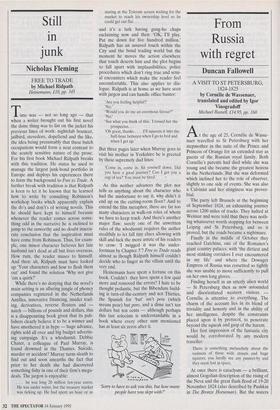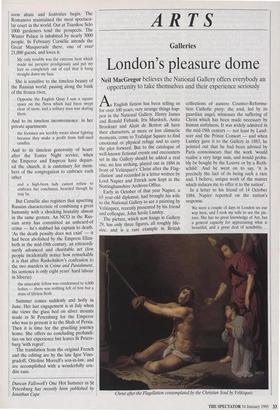From Russia with regret
Duncan Fallowell
A VISIT TO ST PETERSBURG, 1824-1825 by Cornelie de Was senaer, translated and edited by Igor Vinogradoff Michael Russell, £14.95, pp. 160 At the age of 25, Cornelie de Wasse- naer travelled to St Petersburg with her stepmother in the suite of the Prince and Princess of Orange for an extended stay as guests of the Russian royal family. Both Cornelie's parents had died while she was young and she became the greatest heiress in the Netherlands. But she was deformed which inclined her to the role of observer, slightly to one side of events. She was also a Calvinist and her stinginess was prover- bial.
The party left Brussels at the beginning of September 1824, an exhausting journey across 1200 miles of tracks. They halted at Weimar and were told that there was noth- ing whatsoever worth stopping for between Leipzig and St Petersburg, and so it proved, but the roads became a nightmare.
Finally in the middle of October they reached Gatchina, one of the Romanov's giant country palaces, with 'the dirtiest and most stinking corridors I ever encountered in my life' and where the Dowager Empress of Russia was corsetted so tightly she was unable to move sufficiently to pull on her own long gloves.
Finding herself in an utterly alien world — St Petersburg then as now astounded and disorientated western visitors — Cornelie is attentive to everything. The charm of the account lies in its blend of triviality and honesty and in the ability of her intelligence, despite the constraints placed upon it by protocol, to penetrate beyond the squeak and gasp of the harem,
Her first impression of the fantastic city would be corroborated by any modern traveller:
There is something melancholy about the vastness of these wide streets and huge squares; you hardly see any passers-by and they seem lost in space.
At once there is cataclysm — a brilliant, almost Gogolian description of the rising of the Neva and the great flash flood of 19-20 November 1824 (also described by Pushkin in The Bronze Horseman). But the waters soon abate and festivities begin. The Romanovs maintained the most spectacu- lar court in the world. Out at Tsarskoe Selo 1000 gardeners tend the prospects. The Winter Palace is inhabited by nearly 3000 people. In February Cornelie attends the Great Masquerade there, one of over 21,000 guests, and loves it.
My only trouble was the extreme heat which made me perspire prodigiously and put my hair so completely out of curl that it hung straight down my face.
She is sensitive to the timeless beauty of the Russian world: passing along the bank of the frozen river,
Opposite the English Quay I saw a square space on the Neva which had been swept clear of snow, and a solitary man was skating there.
And to its timeless inconvenience: in her private apartments
the footmen are terribly mean about lighting because they make a profit from half-used candles.
And to its timeless generosity of heart: after the Easter Night service, when the Emperor and Empress have depart- ed the church, it is customary for mem- bers of the congregation to embrace each other
and a high-born lady cannot refuse to embrace her coachman, bearded though he may be.
But Cornalie also registers that upsetting Russian characteristic of combining a great humanity with a shocking brutality almost in the same gesture. An NCO in the Rus- sian army has committed an unheard-of crime — he's stabbed his captain to death. `As the death penalty does not exist' — it had been abolished by the Empress Eliza- beth in the mid-18th century, an extraordi- narily advanced and charitable act (few people incidentally notice how remarkable it is that after Raskolnikov's confession to the two murders in Crime and Punishment, his sentence is only eight years' hard labour in Siberia)
the miserable fellow was condemned to 4,000 lashes — there was nothing left of him but a mass of lifeless flesh.
Summer comes suddenly and hotly in June. Her last engagement is in July when she views the glass bed on silver mounts made in St Petersburg for the Emperor who was to present it to the Shah of Persia. Then it is time for the gruelling journey home. She offers no concluding profundi- ties on her experience but leaves St Peters- burg 'with regret'.
The translation from the original French and the editing are by the late Igor Vino- gradoff, Ottoline Morrell's son-in-law, and are accomplished with a wonderfully eru- dite ease.
Duncan Fallowell's One Hot Summer in St Petersburg has recently been published by Jonathan Cape.










































 Previous page
Previous page